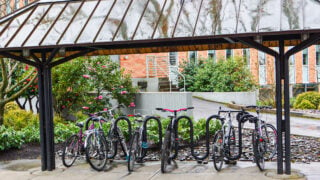
(Photos by Becky Jo)
I imagine most of you bike because it’s just what you do and who you are. But what about folks who aren’t there yet?
Last week when we discussed freight intermodal transportation and compared it to multimodal human transportation, I left out some of my conversation with Clint Culpepper, the Transportation Options Manager at Portland State University. He left me with some choice phrases that brought up more questions for me.
Clint said PSU surveys show a decline in biking among students and staff. He suggested students are like an indicator species: When housing is less affordable and/or available around campus, fewer students bike to school. In Clint’s PSU transportation surveys, the bike-commute threshold was at about three miles, and as students are forced to live farther out, biking to school is less of an option for them.
The day I went down to PSU, all the BikeTown bike racks by the school were empty, but so were all the dorm bike racks. I asked my dorm-kid if he said he knew of or saw a lot of cyclists. He said “no” and that he thought most people used transit to commute in to campus. Granted, Clint’s data is more than adequate for me; I just mention this to say I didn’t see any glaring opposition to Clint’s information.
I biked over to University of Portland afterwards, which is in my neighborhood. I’m not here on BikePortland as a reporter, but I did take a couple shots of U of P bike racks. I go over to U of P quite a bit, and they’re always full. They’re full at the faculty buildings and at the dorm buildings. But that supports Clint’s data, right? U of P campus meets the three-mile threshold.
For those of you commuting longer suburb-to-city distances, does this seem to ring true? How do we make biking longer distances easier? E-bikes or multimodal are obvious answers, but they’re not being adopted at exactly a rapid clip. We might see fewer bike stores closing if that were the case. Something in the equation must be missing.
Advertisement

Clint gave me a really good possible answer which rang true with me. See, I spent a good chunk of my childhood in Boring, Oregon. Going to someone’s house was in terms of acres or miles — not blocks — and often included 55 mph speed limits. Clint used a college kid coming in from Aloha (an unincorporated town in Washington County) as an example, but same difference, right? We’re not exactly raised with “bike culture” in rural areas. My high school had Future Farmers of America and snowboarders. My neighbors were cows, chickens, farmers, and migrant farm workers.
In the comments last week, I asked reader Jason (who’s the same age as me and has mentioned biking is just part of him) how he got that way. It’s what I suspected: Jason was raised with a bike early on, was riding all over, and while he’s had points without one, it’s part of him now. I’m starting at age 45. Jason has about 30 years of biking on me. How do we get more Jasons and more 45-year-olds doing an about-face? (I don’t recommend the economic-impact-method, by the way.) But seriously, how? I’m teaching my kids transit and biking now, some with more success than others, but what about all the rural and suburban kids? What about the adults? How do we get a culture shift?
How did your bike become part of your identity? And does that help you push through barriers like a long commute?
With the way things are going, many of us may face the economic-impact-method whether we like it or not. I know, there may not be a black and white answer, but it seems now might be the time to strike while the iron’s hot.
As always, thank you so much for hanging out with me on here.
— Becky Jo, @BeckyJoPDX
— Get our headlines delivered to your inbox.
— Support this independent community media outlet with a one-time contribution or monthly subscription.

